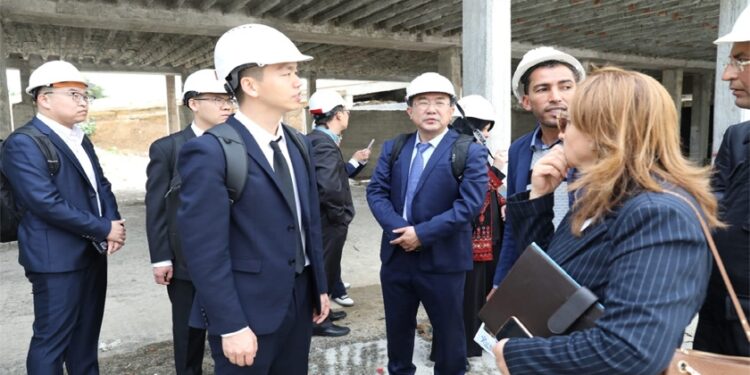China multiplies projects in Tunisia, at a rate never seen before. Infrastructure, industry, tourism, health: the fields of intervention are diversifying, as Tunis and Beijing strengthen their links. If some see a boon, others wonder about the real benefits of this Chinese presence. Decryption of an expanding dynamic.
Since the tour of the Tunisian president in China at the end of May 2024, bilateral cooperation has crossed a milestone. This trip made it possible to formalize a global strategic partnership, opening the way to an intensification of economic and political exchanges.
In the field, projects are quickly materialized. Among the most emblematic, the new Bizerte bridge, 2.1 kilometers long, is under construction by the Chinese group Sichuan Road and Bridge Group. This project aims to modernize access to the north of the country and fluidify maritime transport.
In the field of sport, the rehabilitation of the El Menzah Olympic stadium benefits from Chinese funding. In parallel, Chinese companies are interested in the automotive sector, with projects for the establishment of spare parts manufacturing factories in Tunisia.
On the industrial level, in addition to the salt deposits that will be explored by the Chinese, a Chinese group is about to acquire Tunisian cement plants for more than $ 100 million. It is one of the biggest recent Chinese direct investments in the country.
The tourism sector is not to be outdone: Tunisia aims to attract 30,000 Chinese tourists in 2025, against 20,000 the previous year. Beijing also supports the creation of cultural and educational centers, like the Confucius Institute of Sousse or projects of university hospitals, notably in Sfax.
A comparison with other African countries
Tunisia is not an isolated case. For a decade, China has become one of the main investors on the African continent. Colossal projects have emerged in several countries:
- In Kenya, China has funded the Nairobi – Mombasa rail line, a major infrastructure for the country.
- In Ethiopia, the Chinese have invested in railways, roads and hydroelectric dams.
- In Guinea, Uganda and Gabon, dams, ports and highways came out of the ground thanks to Chinese credits.
These investments have made it possible to fill the infrastructure deficit, create jobs and stimulate growth. However, several African countries have also experienced worrying side effects: high debt, unprofitable projects, lack of technological transfer, and sometimes questionable working conditions.
What impacts?
In Tunisia, Chinese investments have already made it possible to create thousands of jobs, especially in building and industry. The current projects are tackling abandoned structural sectors for years: transport, energy, sports infrastructure or even health.
But some economists call for vigilance. Dependence on a single economic partner can weaken the sovereignty of the country. In addition, transparency around tenders and contractual clauses remains unclear. It is also essential to ensure that the jobs created benefit from Tunisians and that local businesses are integrated into value chains.
Behind the investments visible in bridges, stages or factories, China continues in Tunisia a wider strategy, combining economic advantages and cultural influence. What Beijing is looking for is not only a market, but a strategic partner in the Mediterranean region, at the crossroads of Africa, Europe and the Middle East.
What does Tunisia China want?
On the economic level, Tunisia is a potential point of entry to European markets, thanks to its preferential agreements with the EU. Its skilled workforce and port infrastructure-like the future deep waters of Enfidha-particularly interest Chinese groups that wish to relocate or export west more quickly.
But beyond the economy, Beijing deploys a real soft power in Tunisia, in a logic of cultural influence. The opening of a Confucius Institute in Sousse, the multiplication of scholarships for Tunisian students, or the growing dissemination of Chinese audiovisual programs in Arabic are all examples of this cultural rooting strategy.
More recently, supervised visits programs for Tunisian journalists in China have multiplied, often funded by the Chinese government or agencies related to the Communist Party. These trips aim to shape a favorable image of China and to forge links with key actors in public opinion. For Beijing, Tunisia is not only a project, it is also a media, a relay and potentially a diplomatic ally in international speakers.
In this perspective, China takes care of its communication, insists on respect for Tunisian sovereignty, and presents itself as a benevolent alternative to the old colonial powers or the conditionalities of Western institutions.








